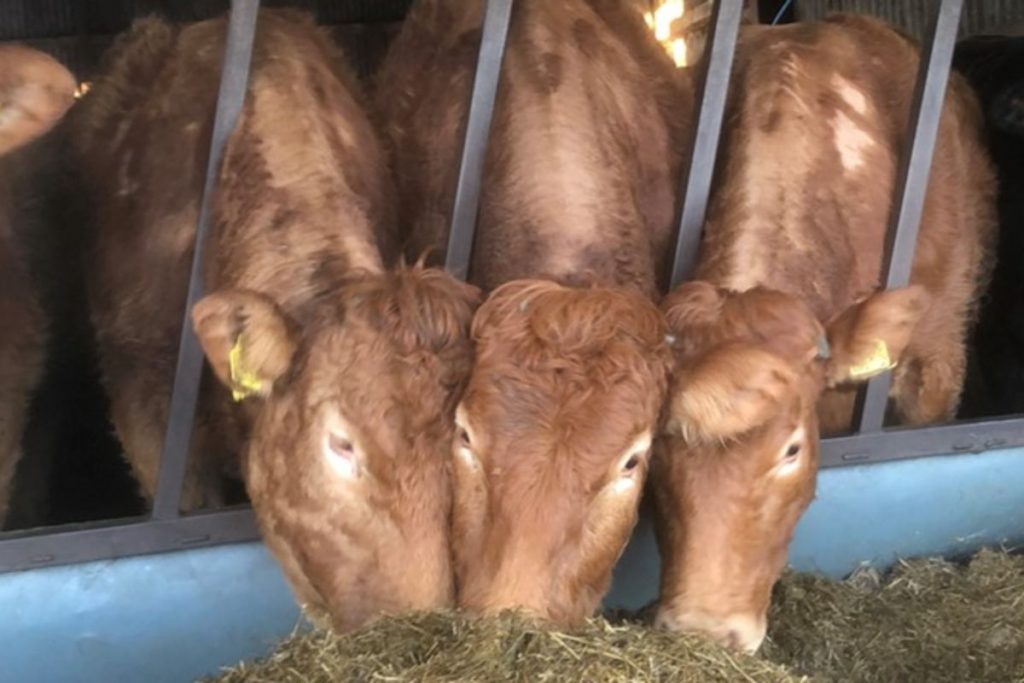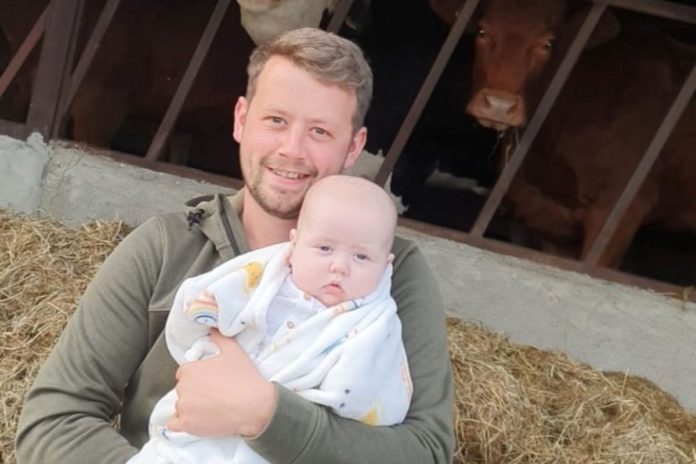Catherina Cunnane, That’s Farming editor, in conversation with Maurice Tannahill (31) of Ballywilliam Farm as part of this week’s Suckler Focus. They discuss being part-time farmers, a 68-cow herd, phasing out commercial females, and why the Limousin breed is a perfect fit for this farm.
“I hail from Macosquin, a rural village just a few miles from Coleraine Town in Co. Londonderry.
Farming has been a family tradition at Ballywilliam for five generations. My grandfather was a mixed farmer, growing crops and potatoes alongside a mix of beef and a few dairy cows, milked by hand in the old byre.
A lot of the potatoes were grown at home, but they also rented a fair bit of ground in the Coleraine area.
With profits from potatoes difficult and a lack of willing ‘purty diggers’ available, my father stopped the spuds around 30 years ago.
I farm part-time along with my father, Freddy, who has always had a full-time role alongside the farm. If I had the opportunity to farm at home full-time, I would be delighted.
However, for now, it is essential to have an income coming in from outside the farm. In time, I would love to sustain the farm as a full-time role, but we will wait and see.
I would say there are a lot of farmers across the country in the same boat. We have 45-acres of our own and rent a further 20 from a neighbour.
Part-time farmers
For many years, my father was a self-employed landscape gardener but took on a full-time driving role for a local concrete company in later years.
After leaving school, I had planned to become a plumber. However, the financial crisis in 2007 made it very difficult for young people to get into the trade. I then went to university, but I always knew I would make it back to the farm.
I have grown up watching my father and grandfather on the farm and seeing the passion they have towards it. It was inevitable that farming would become a huge part of my life.
Growing up on a farm has been very rewarding – employers often admire it, and it always gives something to talk about. The hard work and dedication which goes into farming will serve you well with many life skills.
Mixed suckler herd
In total, we have 68 cows, with 42 of those being pedigree Limousin and the rest commercial cattle – a mix of cross-breds.
Some of the pedigree herd is non-registered, but I do plan to have the whole Limousin herd registered in the coming years.
The size of the herd at present is primarily a credit to my father. When he took over the farm 20 years ago, the commercial suckler herd at most would have included 30 cattle.
His decision to increase over the years comes down to a love for farming and suckler cows.
He bought two pedigree Limousin cows from a sale in Ballymena Mart over ten years ago and increasing to 42 involved a lot of hard work and money.
I owe a huge thanks to him for what I have succeeded in doing. My little boy is cow mad already – whether he decides to farm or not. If I can leave the farm in a similar or better position to what I got, it will be okay!
The decision to go down the Limousin route was very simple – they have built a reputation for being the carcase breed and producing beef with a low proportion of bone and fat and guarantee excellent productivity. This suits our system very well.
Easy calving, growth rates and excellent muscle development also make it a solid choice. They are also fantastic mothers and rare their calves admirably. Plus, in my opinion, a field full of Limousins is just a lovely sight!

Breeding programme
Until this year, breeding on our farm has been down to a stock bull. In January 2021, we used AI for the first time for five of our maiden heifers. Thankfully, they all held the first time with no issues.
We also recently purchased 20 Lodge Hamlet straws, which I plan to use on maiden heifers again. I am very excited and looking forward to seeing what he puts on the ground, and these heifers are due to calf at the end of September this year.
The majority of our herd is spring-calving, with a few commercial cattle calving later in autumn.
We keep about 70% of heifer calves born on-farm for replacements and sell the best bulls at the market as working bulls.
Furthermore, we sell the remainder when they are 500kgs. We have had a huge difference in the numbers of heifers and bulls born on-farm in recent years. Unfortunately, this means there are not many selling days throughout the year – a few more bulls wouldn’t go amiss!
In simple terms, the perfect cow for me can calf herself with little difficulty and rare her own calf.
Thankfully, the ease of calving within the pedigree herd is very good. However, I recently purchased one of the Moocall Calving monitors to keep a better eye when I am not on-farm.
At first, I was a bit wary, but they are a fantastic bit of kit. If anyone is considering getting one, go for it!

Targets
In terms of targets, my father’s answer would be fairly simple…retirement! Like many beef farmers, he likely feels that one job would be enough for him at this point in life, but I know he will never lie down.
Personal targets include getting into the breeding and fertility of the herd. Like everything these days, costs seem to be running wild. I feel the only way to remain sustainable is to knuckle into the breeding and grow the prowess of the herd.
For me, the main elements in running a successful suckler herd are dedication, hard work and the passion for what you do.
It is important to remember that you always get out what you put in and that it is not always about the money.
I suppose we are a bit of a rare breed, but as the saying goes, it’s in your blood, and if you don’t love what you do, then you’re better staying away from it.
The Vet Service
For over two years now, I have been employed at The Vet Service. TheVetService.com is a veterinary job and training platform located in Northern Ireland, working with many local practices but active worldwide, including USA, CA, NZ, AU, for example.
I work here full-time, and the majority of my role involves working with vets and practices in NI, ROI and USA.
The Vet Service has played a very important role in helping vet practices fill their staffing requirements.
It is an absolute pleasure working and speaking with practices right around Ireland. This has been a real insight into the veterinary industry for me.
It has been fantastic getting to know so many practice owners and vets, and many a laugh is had, sharing the good and bad times within farm animal veterinary. There are certainly some fantastic stories to be heard!
In NI and ROI, I think many of us are aware of the highly publicised difficulties in recruiting mixed and farm vets for veterinary practices.
In Ireland, I speak with many practices that have been recruiting for a mixed or farm vet for almost a year or more. Due to Brexit, a lot of EU vets now want to work in ROI.
However, it is very difficult for them to find a job without having experience in mixed/farm practice in Ireland.
I am not sure what will make the shortage any easier in the future, but the Vet Service team will continue working closely with our clients to help them meet their needs.
Reflection
I am very satisfied with how things are going on-farm now. I plan to remove the majority of the commercial herd and build a good base for breeding pedigrees coming into the spring.
My father has selected the herd very well. I may be biased, but there are some really good quality cows on our farm at the moment producing growthy calves each year.
A future plan of my own is to get into the breeding plans on the farm, with AI and embryo transfer at the forefront of the breeding system. I feel like this can be a very addictive thing to get into, so I haven’t rushed it.
In summary, I suppose farming will always be seen as not getting paid enough for what you do. I don’t think this opinion will ever change.
Suckler farmers work within a very volatile market, with many waiting long periods for any income to come into their business.
But as I said before if you don’t love what you do, then farming is probably not for you.
I recently set up an Instagram page @ballywilliam_farm to give an insight into what life is like balancing full-time work with part-time farming.”
To share your story like these part-time farmers, email – [email protected]
See more Suckler Focus profiles.





